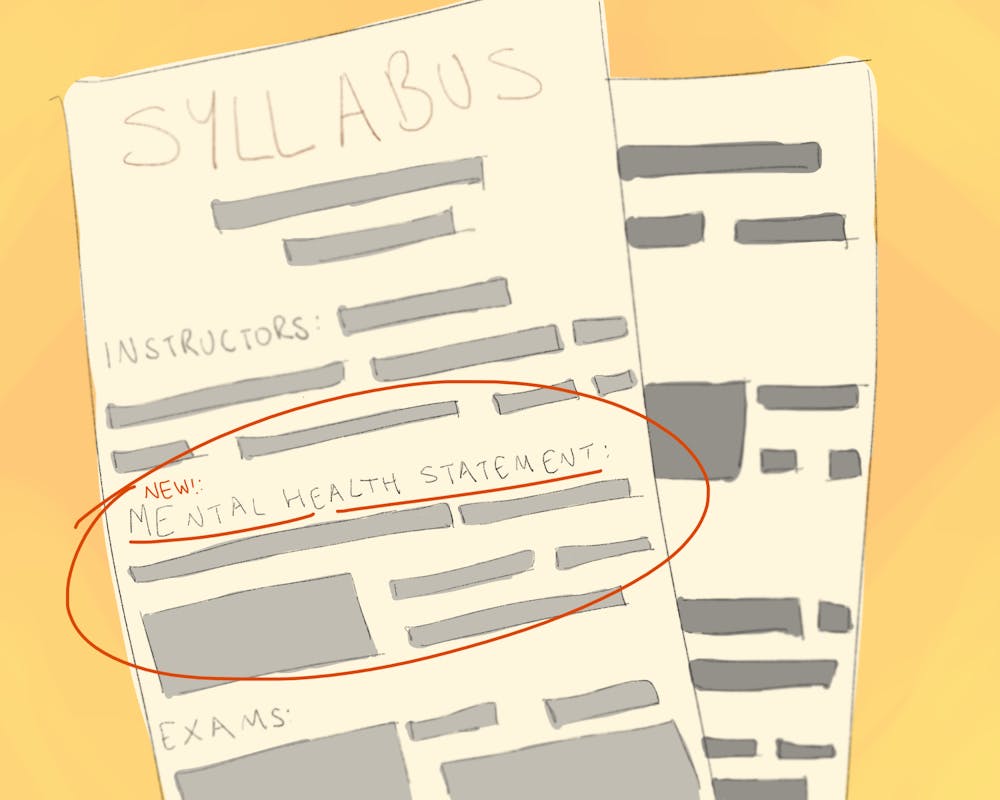Mental health statement required on future syllabi

The faculty senate passed a resolution mandating a mental health statement on all university syllabi at the Sept. 28 senate meeting. The resolution, which passed in the Student Association senate on Jan. 27, 2022, states that every syllabus must encourage students to reach out to Wellbeing and Counseling to discuss mental health concerns and should contain a list of related resources for students.
The resolution that passed in the faculty senate omitted part of the original SA resolution, which asked for the mandatory statement to establish the professor’s policies on academic adjustments for academic-related mental health concerns, including extensions and attendance policies.
Alexandra Kieffer, speaker of the faculty senate, said that she felt this resolution was a reasonable request, especially in a post-COVID world where mental health issues are ever-present in the student population.
“We were taking what I think everyone agreed to be a good idea from the SA and making it into … a package we could actually put on the syllabus,” Kieffer said.
Kieffer said that there is a wide range of mental health issues, ranging from mild anxiety to a serious depressive episode, and faculty are not trained to differentiate between these situations and counsel students. The executive committee had to ensure their instructions complied with university standards and would avoid unintended consequences while implementing this resolution, she added.
“We want to make sure that students are reaching out to Wellbeing and Counseling center and encouraging students to seek out the resources that we have on campus, [but] … we don’t want faculty to inadvertently put themselves in a position where they might make a student’s mental health worse by not responding in a way that a student might want or expect,” Kieffer said.
The SA’s original resolution requested that students be able to reach out about mental health accommodations without a Disability Resource Center requirement. Alison Qiu, a co-writer of the SA resolution, said she was disappointed that the faculty senate didn’t adopt that portion of the resolution.
“I’m happy that part of it is passed by the faculty senate and that there will be a requirement for the professors to include a statement on the syllabus,” Qiu, a Hanszen College sophomore, said. “But I’m not totally satisfied because the original last clause … was tabled.”
Professor Sandy Parsons, who has included a section on mental health on her class syllabi for many years, said that while she is pleased to see the resolution pass, she wishes there was more language of support required.
“As a professor, I see that students often apologize for asking for extensions due to mental health issues or do not share their needs with me soon enough for me to help them, and I think those are reflections of the stigma students feel,” Parsons said.
Parsons said she thinks this statement will help normalize asking for help from professional counselors and increase awareness of resources available at Rice. However, she said she thinks professors need to be more proactive in their roles to support students dealing with these issues.
“With the national increase in mental health issues, we need to be proactive as professors to ensure that our students know professional help is available,” Parsons said. “Professors outside of clinical psychology have little to no training in dealing with mental health issues. But we are often the first stop for students who are having problems.”
Director of Rice Counseling Center Timothy Baumgartner said that having a statement added to syllabi will remind students of resources available to them, and will provide faculty with information to refer students who they think could benefit from extra support.
Parsons said she believes students must prioritize their mental health.
“Sometimes students need to prioritize their mental health at the cost of their school work,” Parsons said. “Obviously, in the ideal situation, professors would prefer that students prioritize their classes. But, I hope that students know that it’s ok to choose ‘not school’ sometimes.”
More from The Rice Thresher

O’Rourke rallies students in Academic Quad
Former U.S. Rep. Beto O’Rourke of El Paso, Texas spoke in front of the Sallyport to a sea of sunglasses and “end gun violence” signs April 17. The rally, organized by Rice Young Democrats, took place in the academic quad from noon to 2 p.m.

Five international visas revoked at Rice
Federal authorities have revoked visas for five international affiliates at Rice — three current students and two recent graduates, President Reginald DesRoches announced in an April 11 message to campus. The revocations are “not related to social activism or protests,” a university spokesperson told the Thresher.

Modified Beer Bike races rescheduled to April 18
Beer Bike races have been rescheduled for April 18 at 5-8 p.m. The makeup event was announced in an email to Beer Bike captains, coordinators and stakeholders, from the campuswide coordinators and the Bike Captains Planning Committee.

Please note All comments are eligible for publication by The Rice Thresher.